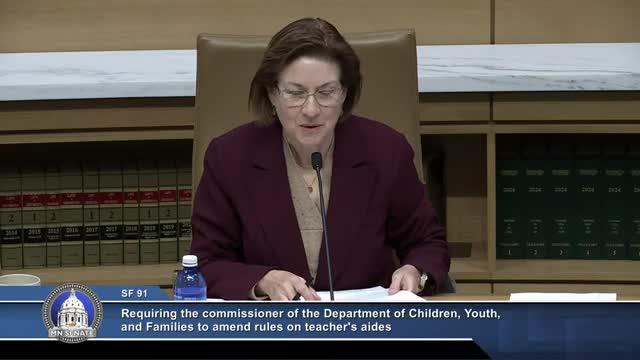Senate advances continuation of childcare staffing flexibility allowing aides to supervise part of the day
Get AI-powered insights, summaries, and transcripts
Subscribe
Summary
The committee recommended passage of Senate File 91, removing a sunset to continue temporary childcare staffing flexibility that allows aides to be alone with children for up to 25% of the day under specific guardrails.
Senate File 91, which would make permanent a staffing flexibility for licensed childcare centers first enacted in 2023, was recommended to pass by the Senate Health and Human Services Committee on Feb. 18, 2025 and placed on the Senate general orders calendar.
Sponsor Senator Hoffman and representatives of childcare providers told the committee the policy has operated for 18 months with no reported safety issues and helps address staffing shortages by allowing aides to supervise children for up to 25% of the day under guardrails intended to preserve safety and training.
Claire Sanford, government relations chair for the Minnesota Child Care Association, described the measure as “a continuation of what is currently in law that was passed in 2023” and said the A2 amendment the committee adopted removes the sunset that would otherwise end the flexibility in July. Sanford said that aides allowed to be alone with children must be at least 18, have 30 days of employment at the center, and—if they have been employed for fewer than 90 days—must complete required licensing training sooner to serve in that capacity.
Jen Orth, owner of High Point Child Care, described operational benefits: scheduling teachers during core instructional hours and having aides cover transitions improves staff retention, reduces overtime, and helps maintain program stability. “Allowing aides to supervise up to 25% of the day independently has had no negative impact on the quality of care, safety, or well-being of the children at our centers,” Orth said.
Members asked procedural and technical questions about the divided A2 amendment. Committee discussion referenced that the amendment was split so that lines 1.1 to 1.14 were adopted and the remainder was not; members clarified the amendment’s technical effect and that no other committee referrals were required for the amended bill.
Senator Hoffman moved that SF 91, as amended, be recommended to pass and be placed on general orders; the committee approved the motion by voice vote. The committee record shows the measure advanced to the Senate floor without further committee referrals.
Providers said the temporary flexibility had allowed programs to avoid reduced hours due to staffing shortages and had enabled scheduling that focuses certified teachers on core learning times. Testimony included operational details such as centers extending availability to approx. 10.5 hours per day and using the policy to reduce overtime and burnout.
The committee placed SF 91 on general orders on Feb. 18, 2025.
